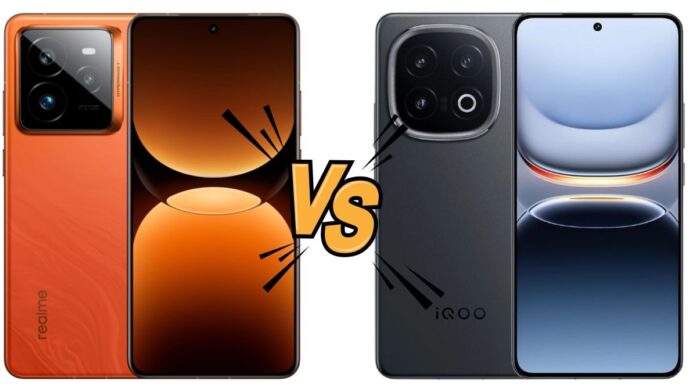Realme and iQOO are all set to launch their flagship smartphones in India in the near future. Realme has confirmed that it will launch the Realme GT 7 Pro in India on November 26. On the other hand, iQOO will introduce its flagship, iQOO 13, in the country in December. Interestingly, both models will be among the first in the country to be powered by the latest Qualcomm Snapdragon 8 Elite processor. The latest chipset from Qualcomm was recently unveiled and is the first chipset from the brand that is built using TSMC’s second-generation 3nm process.
Qualcomm claims that the new chipset offers 40 percent improved performance as compared to the Snapdragon 8 Gen 3 chipset. That said, Realme and iQOO are among the first manufacturers to launch their latest models with the Snapdragon 8 Elite chipset. With both of them launching in India pretty soon, here’s a quick comparison between the Realme GT 7 Pro and iQOO 13 to give you a fair idea about their features and specifications.
Realme GT 7 Pro vs iQOO 13: Design
The Realme GT 7 Pro comes with a premium design language. The handset features a flat display at the front with slim bezels, while the back panel offers a large camera module. The smartphone will be available in Mars Orange, Star Trail Titanium, and White colour options. The Realme GT 7 Pro measures 162.45 x 76.89 x 8.55mm and weighs 222.8 grams.
The iQOO 13, on the other hand, offers a similar look compared to previous iQOO models. You get a large offset camera module at the rear. Interestingly, the camera module comes with a halo light that can adapt to the game scenes and offers 72 light effects. The model is available in Legend, Track, Nardo Grey, and Green colour options. The handset measures 63.37 x 76.71 x 7.99mm for Track Edition and 8.15mm for the rest of the colour options. It weighs 207 grams for Track Edition and 213 grams for other editions.
Realme GT 7 Pro vs iQOO 13: Display
The Realme GT 7 Pro is loaded with a 6.78-inch 1.5K 8T LTPO Eco² OLED Plus micro-curved screen. The display is claimed to offer up to 6,000nits of peak brightness and 2600Hz high-frequency PWM dimming. It also supports a 120Hz screen refresh rate and a 2,600Hz touch sampling rate. The panel supports a 120 percent DCI-P3 colour gamut, HDR 10+, and Dolby Vision.
Meanwhile, the iQOO 13 5G packs a 6.78-inch Quad HD+ curved BOE Q10 LTPO AMOLED display. The screen offers a resolution of 1440×3168 pixels and packs a 144Hz refresh rate. The panel is said to offer up to 4,500nits of peak brightness and 2592Hz full high-frequency dimming. It also supports HDR10+, DCI-P3 colour gamut, and Dolby Vision.
Realme GT 7 Pro vs iQOO 13: Performance and OS
In terms of performance, both models are powered by the latest Qualcomm Snapdragon 8 Elite processor. The latest chipset from Qualcomm is built on the TSMC’s second-generation 3nm process. The chipset packs a second-generation custom-built Qualcomm Oryon CPU with eight cores with a peak clock speed of 4.32GHz.
It also features Qualcomm Adreno GPU and enhanced Hexagon NPU for improved gaming and AI performance. Moving on, both the models pack up to 16GB LPDDR5X RAM and up to 1TB of UFS 4.0 storage. In terms of software, both models run on Android 15. The Realme GT 7 Pro features Realme UI 6.0, while the iQOO 13 runs on Funtouch OS 15.
Realme GT 7 Pro vs iQOO 13: Cameras
In terms of cameras, the Realme GT 7 Pro packs a triple-camera setup. The device features a 50-megapixel Sony IMX906 primary sensor with OIS support, an 8-megapixel ultra-wide-angle lens with 120-degree FoV, and a 50-megapixel periscope telephoto sensor with 3x optical zoom and 120x hybrid zoom. On the front, the handset comes equipped with a 16-megapixel camera with f/2.45 aperture. The handset supports 8K video recording support as well.
The iQOO 13 device is also loaded with a triple-camera setup on the rear panel. The company has added a 50-megapixel Sony IMX921 sensor with f/1.88 aperture, a 50-megapixel ultra-wide-angle lens with f/2.0 aperture, and a 50-megapixel telephoto lens with 4x lossless zoom. On the front, the handset is equipped with a 32-megapixel selfie camera with f/2.45 aperture.
Realme GT 7 Pro vs iQOO 13: Battery and Connectivity
The Realme GT 7 Pro packs a 6,500mAh battery and supports 120W fast charging support. The device features an in-display ultrasonic fingerprint sensor and infrared sensor. In terms of connectivity, you get 5G, dual 4G VoLTE, Wi-Fi 7, Bluetooth 5.4, GPS, GALILEO, Beidou, QZSS, NFC and a USB Type-C port.
On the other hand, the iQOO 13 is backed by a 6,150mAh battery and offers 120W fast charging support. Just like the GT 7 Pro, you also get an in-display ultrasonic fingerprint sensor and infrared sensor. Connectivity options include 5G, 4G LTE, Wi-Fi 7, Bluetooth 5.4, NFC, GPS, and a USB Type-C port.
Realme GT 7 Pro vs iQOO 13: Conclusion
To conclude, both models offer flagship-grade features and specifications. The Realme GT 7 Pro and iQOO 13 offer competitive features and specifications. The Realme GT 7 Pro packs a slightly better display, while the iQOO 13 offers a better camera setup if we go by the specs sheet. Moreover, both models come equipped with the latest Qualcomm chipset, which makes them one of the most powerful Android smartphones in the market. That said, pricing would be the crucial factor here, and it would be interesting to see how well both brands will price their models in India. So, stay tuned with us as we will keep you posted on the launch of Realme GT 7 Pro and iQOO 13.
Realme GT 7 Pro vs iQOO 13 comparison


